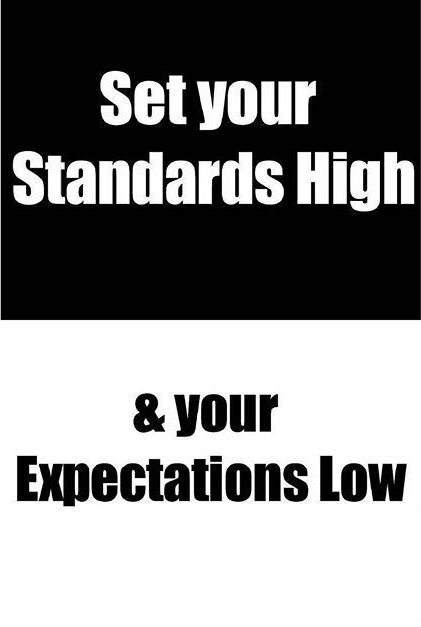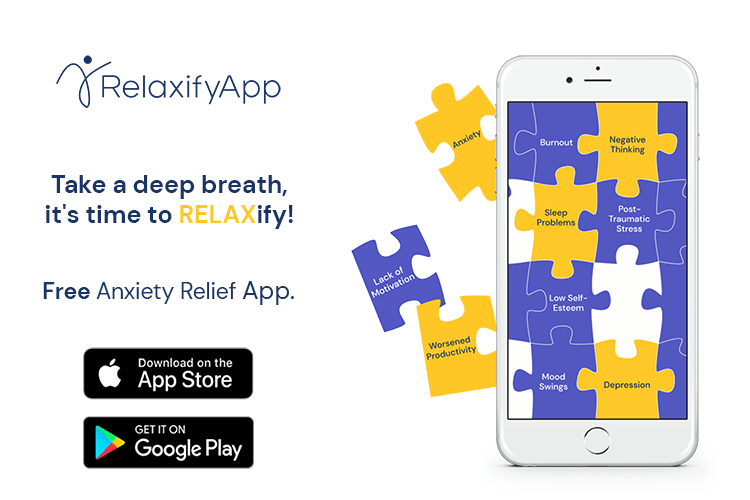High Expectations vs. High Standards in a Relationship
Building and maintaining healthy relationships with others is not an exact science, and you can’t use a single formula to get you safely through your social realm. Anyway, there are still some basic principles you can figure out and try to follow when looking to bring some structure to your interpersonal communication patterns.
Understanding the logic of standards and expectations is easily on the top of the list. And learning to use that insight in a healthy and transparent manner quickly follows.
So, today, we are shining some light on the difference between high expectations vs. high standards, along with the ways to incorporate them in your relationships with others – be them romantic partners, friends, relatives, or colleagues.

What’s the Difference Between Standards and Expectations?
First of all, we need to make a clear distinction between both terms, regardless of how intuitively close to each other they may seem.
Standards are Your Steady Compass
Your standards are your personal set of “norms” of acceptable and unacceptable. They are rather unambiguous and pretty factual: open romantic relationships are either acceptable to you or not; sharing your budget is either acceptable or not; you can either accept being “seen” for three days, or not.
Standards are not person-specific. They are the healthy boundaries, values, and principles you use to protect yourself from people and situations that you can’t tolerate. When you try to define your own value system, you’re not thinking of a potential partner – you are thinking of yourself.
Also – believe it or not – not everyone has the same standards in a relationship, and being open about your basis for judgment is vital for evaluating your fundamental compatibility with a person in the first place.
Expectations are Your Fleeting Assumptions and Beliefs
If standards are very real, fixed, and persistent, expectations are more fluctuating, more dynamic, and more burdened with subjective emotion. Basically, they are your belief that something will happen or that someone will act in a certain way.
Expectations can emerge, form, and evolve as a result of past experiences or hopes for the future. They can be fact-driven or absolutely irrational; they can be too optimistic or too pessimistic; they can be logical or not. And – as you may have already figured out yourself – relationship expectations can also be very painful if they are incongruent with what others deliver.
At the end of the day, both standards and expectations need to be intelligently managed if you’re after a fruitful, mutually satisfying relationship.
Why is Having High Standards in a Relationship Important?
Having high standards in love is basically a form of self care and self respect. If you’re struggling with your self esteem, you can easily slip and keep on tolerating behavior that hasn’t met your standards. That’s you being toxic to yourself – because no one else can be, unless you let them be.
Your standards should never be lowered in order to meet the expectations of others. This simple management rule is evergreen, no matter if you’re running a business or your personal life.
Always keep in mind that your momentary passions and fleeting affections will most probably sink into oblivion – but your mere self will always be in the spotlight, and a heartbreak is always better than self destruction.
Some of the examples of high standards in a relationship might be:
- Respect for your opinions, feelings, needs, beliefs, and desires;
- Shared values, ethics, morals, and even philosophy;
- Honesty, trustworthiness, and transparency in challenging situations;
- Feeling of safety, equality, and affection;
- Healthy conflict management and ability to communicate freely;
- Mutual attraction and corresponding level of desire, etc.
You have a long list of high standards in a relationship? Good for you. Don’t settle with anything less, because you will most probably regret it in the long term.
How to Manage Your Expectations in a Relationship?
To have high standards is one thing; but to manage your expectations is a different story. The correlation between those two is not unproblematic, especially when big feelings get in the way of your realistic judgment.
The worst-case scenario is the one where you have high expectations towards people who obviously don’t even stand up to your standards. Being in love often does this trick to people, and that’s the fastest shortcut to disappointment.
All in all, expectations are not the enemy. On the contrary – they can navigate your experience well enough, as long as they are realistic.
So, how to set expectations in a relationship?
- Take your time to reflect. Grow out of the moment and make your own list of general expectations you would have towards any partner before and after the current one. Become aware of your own needs, because that’s the only way you can share them.
- Make it a two-way street. Instead of giving up a list of demands, find a subtle way to communicate them softly and with emotional intelligence. A good strategy would be discussing your partner’s expectations as a way to understand, evaluate, and compare them with yours.
- Be open and honest. Being subtle and soft doesn’t mean being ambiguous and relying on some vague hints to make you understood. Call things by their real names and don’t substitute “I like spending the weekends alone in the mountains” with “I generally value my space”.
- Look at the bigger picture. Of course, your expectations might include your partner passionately singing along to your favorite song while sharing a twin flame moment. Anyway, focus your expectations around larger discourses like love language, life goals, compassion patterns – the things that can really affect you and your relationship.
- Leave a little space for growth. It’s rather unrealistic to expect that you and your significant other will have the exact same expectations towards each other. At the end of the day, you’re different people and staying open-minded is okay as long as it doesn’t mess with your standards.
If you follow this simple pattern, designing healthy expectations becomes a mission not-so-impossible. Especially if you have the right person standing in front of you.

High Expectations vs. High Standards: The “Standards – High, Expectations – Low” Strategy
Undoubtedly, having high expectations in a relationship can leave you frustrated for a long while – and the more unrealistic your assumptions, the greater the disappointment. Anyway, having no expectations at all is equally unhealthy.
Volumes of philosophy and psychology have been written on the role of dreams, desires, and expectations in one’s life. So – once you’re sure your prospective partner is near your standards of a good match, your expectations will eventually occur, whether consciously or not.
Instead of keeping yourself away from all expectations and deliberately distancing yourself emotionally, stay open, direct, and true to yourself and the person next to you. Share your desires; make the extra step to understand and be understood; give it a try and allow yourself to expect great things to happen.
Surely, great things will not always happen. But then – what if they do?


